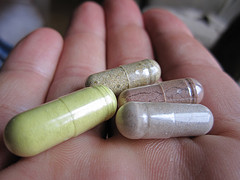33 Methuen Ave.
Lower level
Toronto ON M6S 1Z7

By Zeynep Uraz, N.D.
A woman’s nutritional needs are different than a man’s and an individual’s needs vary depending on a person’s stage of life. Here is a list of supplements that are beneficial to most women. Before you begin taking your supplements, be sure to check with your healthcare provider to make sure that these products are right for you.
Vitamin D - The sunshine vitamin! Most Canadians are deficient in this vitamin. Generally speaking, it’s not necessary to test vitamin D levels before supplementation. A safe dose for adult women, especially during Canadian winters, is 400-1000IU of vitamin D3. I often prescribe this vitamin to my patients in higher doses, but this should be done under the guidance of your healthcare provider. Since vitamin D is fat-soluble, it is best to take this vitamin with food that contains fat, or as a liquid supplement that is in an oil base. Vitamin D helps with reducing falls in elderly people and subsequently, causes fewer fractures. Another interesting benefit of vitamin D is that those who have adequate serum levels have greater success rates when trying to conceive through in-vitro fertilization (IVF) compared to those who have lower serum levels.
Calcium - Not everyone should be supplementing with calcium as it can be harmful in large dosages, but it is important to assess whether or not you are getting enough in your diet. The amount of calcium required for each woman also varies depending on life stage. Many women don’t get enough in their diet. If you are on a dairy-free diet, make sure you are getting enough calcium through other sources such as fortified milk alternatives or foods such as beans, tofu, fish and certain vegetables. A naturopathic doctor can help assess how much calcium you are getting through your food, and determine if additional supplementation is necessary.
Iron - Iron in excessive amounts can be harmful. Having said that, most menstruating women are deficient in iron as there is significant blood loss (and iron loss) through menstruation. Women often do not get enough iron in their diet either. It is very important not to supplement with this mineral without being under the care of a healthcare provider. If you are deficient in iron, it is best to get iron through foods, but it can be difficult to do this in adequate amounts when a deficiency already exists. For this reason, iron supplementation may be necessary. Check with your naturopathic doctor to see which form of iron is best for you. There are a few forms that are better absorbed, easier on the stomach and less constipating. Also, make sure you are not consuming other foods and beverages that inhibit the absorption of iron at the same time. An example of this is drinking green or black tea with your meals or supplements as it can inhibit absorption. Conversely, acidic foods can help the absorption of iron. For this reason, sometimes it is recommended to take vitamin C with your iron supplement.
Folate/folic acid - Folate is an extremely important B vitamin (B9) for all women of childbearing age. Since 1998, white flour, enriched pasta and cornmeal products have been fortified with folic acid in Canada. Despite this, women of childbearing age should supplement with 0.4-1.0 mg of folic acid per day, as adequate folic acid levels prevent neural tube defects. There are some kinds of folate that are absorbed better than others, and some individuals have a genetic enzyme deficiency that causes them to not be able to metabolize folate efficiently. For this reason, I recommend a specific form of folate to all women in case they may be carriers of this gene mutation. Check with your healthcare provider to see how much and which type of folate is best for you.
Keep in mind that although most of these nutrients tend to be deficient in women, a multivitamin is often not a good source of these vitamins. Several studies have shown that multivitamins are essentially a waste of money and effort, since most multivitamins do not have enough of each vitamin or mineral to make a significant difference, and there are some vitamins and minerals that may be in excessive doses such as selenium and beta-carotene. One exception to this rule is that women who are trying to conceive should still take a prenatal multivitamin as this will provide adequate amounts of folic acid, iron, calcium and iodine which are very important in conception and pregnancy.
All of the above information are ideas and generalizations, so remember to check with a health provider who knows your case before starting or stopping any supplement routine. In my practice, I see many women with polycystic ovarian syndrome, HPV, and those who are trying to conceive. In these specific cases, of course, the recommendations for supplementation are unique to the individual. Again, we highly emphasize the importance in talking with your healthcare provider before starting or stopping any supplement routine to be sure you are doing what is best for your body.